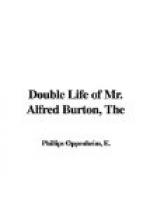Very slowly he changed his coat and climbed on to his worn horsehair stool, without exchanging his usual facetious badinage with the remaining member of the staff. The office-boy, who had thought of something good to say, rather resented his silence. It forced him into taking the initiative, a position which placed him from the first at a disadvantage.
“Any luck with the Yank, Mr. Burton?” he inquired, with anxious civility.
Burton shook his head.
“None at all,” he confessed. “He wouldn’t have anything to do with the house.”
“Has any one been letting on to him about it, do you think?”
“I don’t think so,” Burton replied. “I don’t think any one else has mentioned it to him at all. He seems to be a complete stranger here.”
“Couldn’t have been quite at your best, could you, Mr. Burton, sir? Not your usual bright and eloquent self, eh?”
The boy grinned and then ducked, expecting a missile. None came, however. Alfred Burton was in a very puzzled state of mind, and he neither showed nor indeed felt any resentment. He turned and faced his subordinate.
“I really don’t know, Clarkson,” he admitted. “I am sure that I was quite polite, and I showed him everything he wished to see; but, of course, I had to tell him the truth about the place.”
“The what?” young Clarkson inquired, in a mystified tone.
“The truth,” Burton repeated.
“Wot yer mean?”
“About the typhoid and that,” Burton explained, mildly.
The office-boy pondered for a moment. Then he slowly opened a ledger, drew a day-book towards him, and continued his work. He was being jollied, of course, but the thing was too subtle for him at present. He decided to wait for the next move. Burton continued to regard his subordinate, however, and by degrees an expression of pained disapproval crept into his face.
“Clarkson,” he said, “if you will forgive my mentioning a purely personal matter, why do you wear such uncomfortable collars and such an exceedingly unbecoming tie?”
The office-boy swung round upon his stool. His mouth was wide open like a rabbit’s. He fingered the offending articles.
“What’s the matter with them?” he demanded, getting his question out with a single breath.
“Your collars are much too high,” Burton pointed out. “One can see how they cut into your neck. Then why wear a tie of that particular shade of vivid purple when your clothes themselves, with that blue and yellow stripe, are somewhat noticeable? There is a lack of symphony about the arrangement, an entire absence of taste, which is apt to depress one. The whole effect which you produce upon one’s vision is abominable. You won’t think my mentioning this a liberty, I hope?”
“What about your own red tie and dirty collar?” young Clarkson asked, indignantly. “What price your eight and sixpenny trousers, eh, with the blue stripe and the grease stains? What about the sham diamond stud in your dickey, and your three inches of pinned on cuff? Fancy your appearance, perhaps! Why, I wouldn’t walk the streets in such a rig-out!”




